ENT201: Entrepreneurship and Small Business Management Report
VerifiedAdded on 2020/06/04
|16
|4220
|93
Report
AI Summary
This report provides a comprehensive overview of entrepreneurship and small business management. It begins with an introduction to the field, defining entrepreneurship and highlighting its importance. The report then delves into different types of entrepreneurial ventures, including small business, scalable, large company, and social entrepreneurship, and relates them to entrepreneurial typologies. It explores the similarities and differences between various business types, such as large and small businesses, as well as social and scalable firms. The report also analyzes the impact of micro and small businesses on the economy, emphasizing their role in GDP generation, job creation, and innovation. Furthermore, it discusses the significance of start-ups and small businesses in the growth of the social economy. The report also highlights the characteristics and traits of successful entrepreneurs, including motivation, dedication, and vision, using examples of Larry Page and Steve Jobs. Finally, it examines factors that foster or hinder entrepreneurial traits.

ENTERPRENEURSHIP
AND
SMALL
BUSINESS MANAGEMENT
AND
SMALL
BUSINESS MANAGEMENT
Paraphrase This Document
Need a fresh take? Get an instant paraphrase of this document with our AI Paraphraser
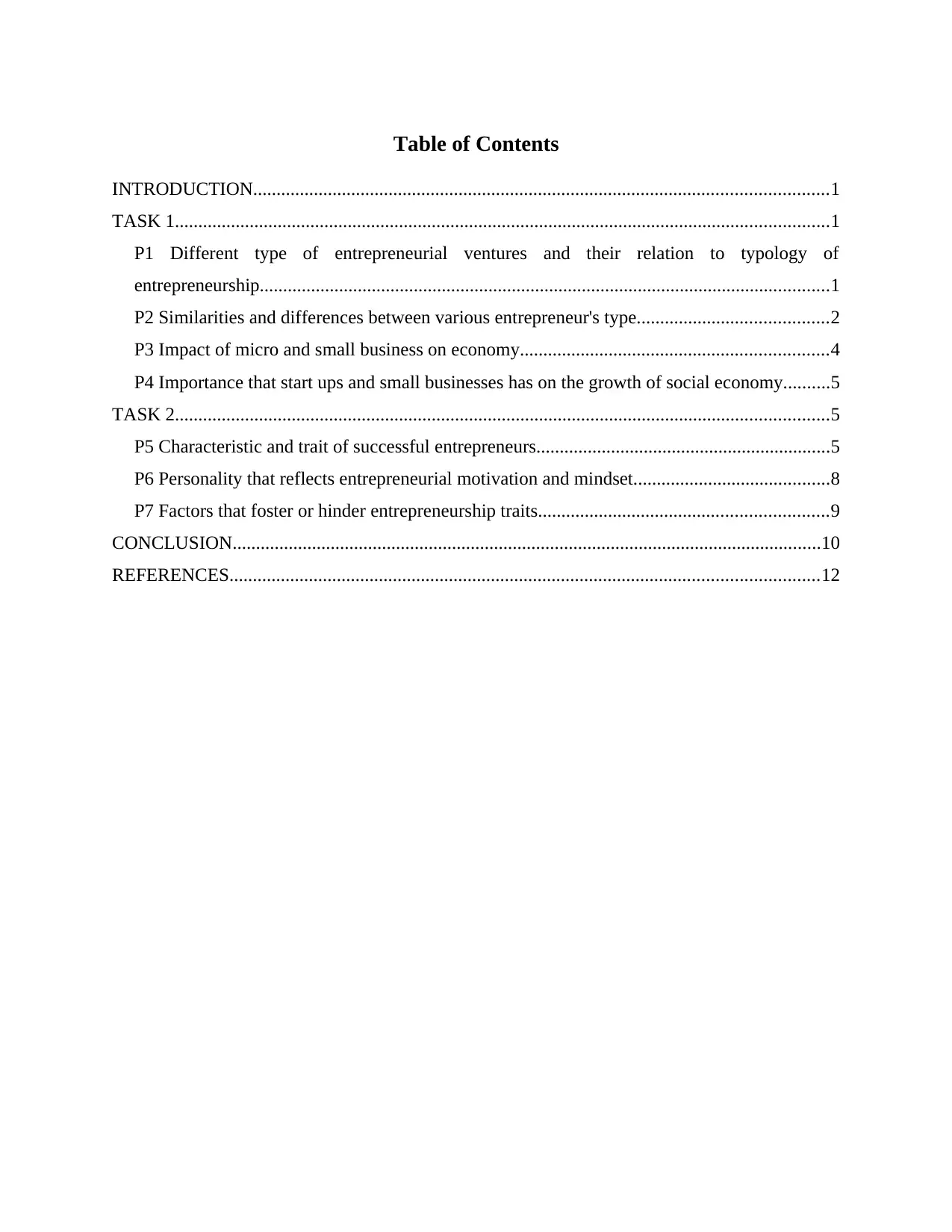
Table of Contents
INTRODUCTION...........................................................................................................................1
TASK 1............................................................................................................................................1
P1 Different type of entrepreneurial ventures and their relation to typology of
entrepreneurship..........................................................................................................................1
P2 Similarities and differences between various entrepreneur's type.........................................2
P3 Impact of micro and small business on economy..................................................................4
P4 Importance that start ups and small businesses has on the growth of social economy..........5
TASK 2............................................................................................................................................5
P5 Characteristic and trait of successful entrepreneurs...............................................................5
P6 Personality that reflects entrepreneurial motivation and mindset..........................................8
P7 Factors that foster or hinder entrepreneurship traits..............................................................9
CONCLUSION..............................................................................................................................10
REFERENCES..............................................................................................................................12
INTRODUCTION...........................................................................................................................1
TASK 1............................................................................................................................................1
P1 Different type of entrepreneurial ventures and their relation to typology of
entrepreneurship..........................................................................................................................1
P2 Similarities and differences between various entrepreneur's type.........................................2
P3 Impact of micro and small business on economy..................................................................4
P4 Importance that start ups and small businesses has on the growth of social economy..........5
TASK 2............................................................................................................................................5
P5 Characteristic and trait of successful entrepreneurs...............................................................5
P6 Personality that reflects entrepreneurial motivation and mindset..........................................8
P7 Factors that foster or hinder entrepreneurship traits..............................................................9
CONCLUSION..............................................................................................................................10
REFERENCES..............................................................................................................................12

⊘ This is a preview!⊘
Do you want full access?
Subscribe today to unlock all pages.

Trusted by 1+ million students worldwide
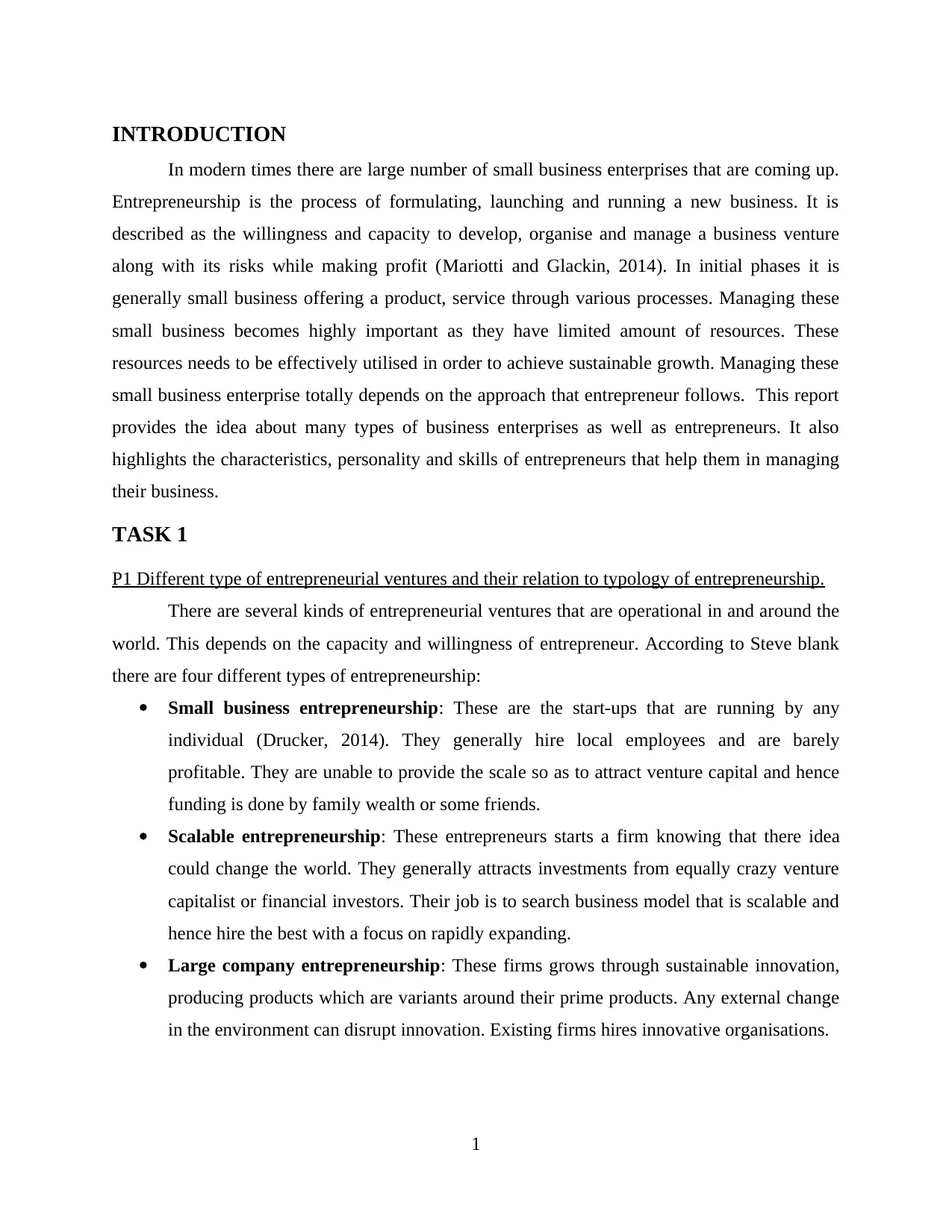
INTRODUCTION
In modern times there are large number of small business enterprises that are coming up.
Entrepreneurship is the process of formulating, launching and running a new business. It is
described as the willingness and capacity to develop, organise and manage a business venture
along with its risks while making profit (Mariotti and Glackin, 2014). In initial phases it is
generally small business offering a product, service through various processes. Managing these
small business becomes highly important as they have limited amount of resources. These
resources needs to be effectively utilised in order to achieve sustainable growth. Managing these
small business enterprise totally depends on the approach that entrepreneur follows. This report
provides the idea about many types of business enterprises as well as entrepreneurs. It also
highlights the characteristics, personality and skills of entrepreneurs that help them in managing
their business.
TASK 1
P1 Different type of entrepreneurial ventures and their relation to typology of entrepreneurship.
There are several kinds of entrepreneurial ventures that are operational in and around the
world. This depends on the capacity and willingness of entrepreneur. According to Steve blank
there are four different types of entrepreneurship:
Small business entrepreneurship: These are the start-ups that are running by any
individual (Drucker, 2014). They generally hire local employees and are barely
profitable. They are unable to provide the scale so as to attract venture capital and hence
funding is done by family wealth or some friends.
Scalable entrepreneurship: These entrepreneurs starts a firm knowing that there idea
could change the world. They generally attracts investments from equally crazy venture
capitalist or financial investors. Their job is to search business model that is scalable and
hence hire the best with a focus on rapidly expanding.
Large company entrepreneurship: These firms grows through sustainable innovation,
producing products which are variants around their prime products. Any external change
in the environment can disrupt innovation. Existing firms hires innovative organisations.
1
In modern times there are large number of small business enterprises that are coming up.
Entrepreneurship is the process of formulating, launching and running a new business. It is
described as the willingness and capacity to develop, organise and manage a business venture
along with its risks while making profit (Mariotti and Glackin, 2014). In initial phases it is
generally small business offering a product, service through various processes. Managing these
small business becomes highly important as they have limited amount of resources. These
resources needs to be effectively utilised in order to achieve sustainable growth. Managing these
small business enterprise totally depends on the approach that entrepreneur follows. This report
provides the idea about many types of business enterprises as well as entrepreneurs. It also
highlights the characteristics, personality and skills of entrepreneurs that help them in managing
their business.
TASK 1
P1 Different type of entrepreneurial ventures and their relation to typology of entrepreneurship.
There are several kinds of entrepreneurial ventures that are operational in and around the
world. This depends on the capacity and willingness of entrepreneur. According to Steve blank
there are four different types of entrepreneurship:
Small business entrepreneurship: These are the start-ups that are running by any
individual (Drucker, 2014). They generally hire local employees and are barely
profitable. They are unable to provide the scale so as to attract venture capital and hence
funding is done by family wealth or some friends.
Scalable entrepreneurship: These entrepreneurs starts a firm knowing that there idea
could change the world. They generally attracts investments from equally crazy venture
capitalist or financial investors. Their job is to search business model that is scalable and
hence hire the best with a focus on rapidly expanding.
Large company entrepreneurship: These firms grows through sustainable innovation,
producing products which are variants around their prime products. Any external change
in the environment can disrupt innovation. Existing firms hires innovative organisations.
1
Paraphrase This Document
Need a fresh take? Get an instant paraphrase of this document with our AI Paraphraser
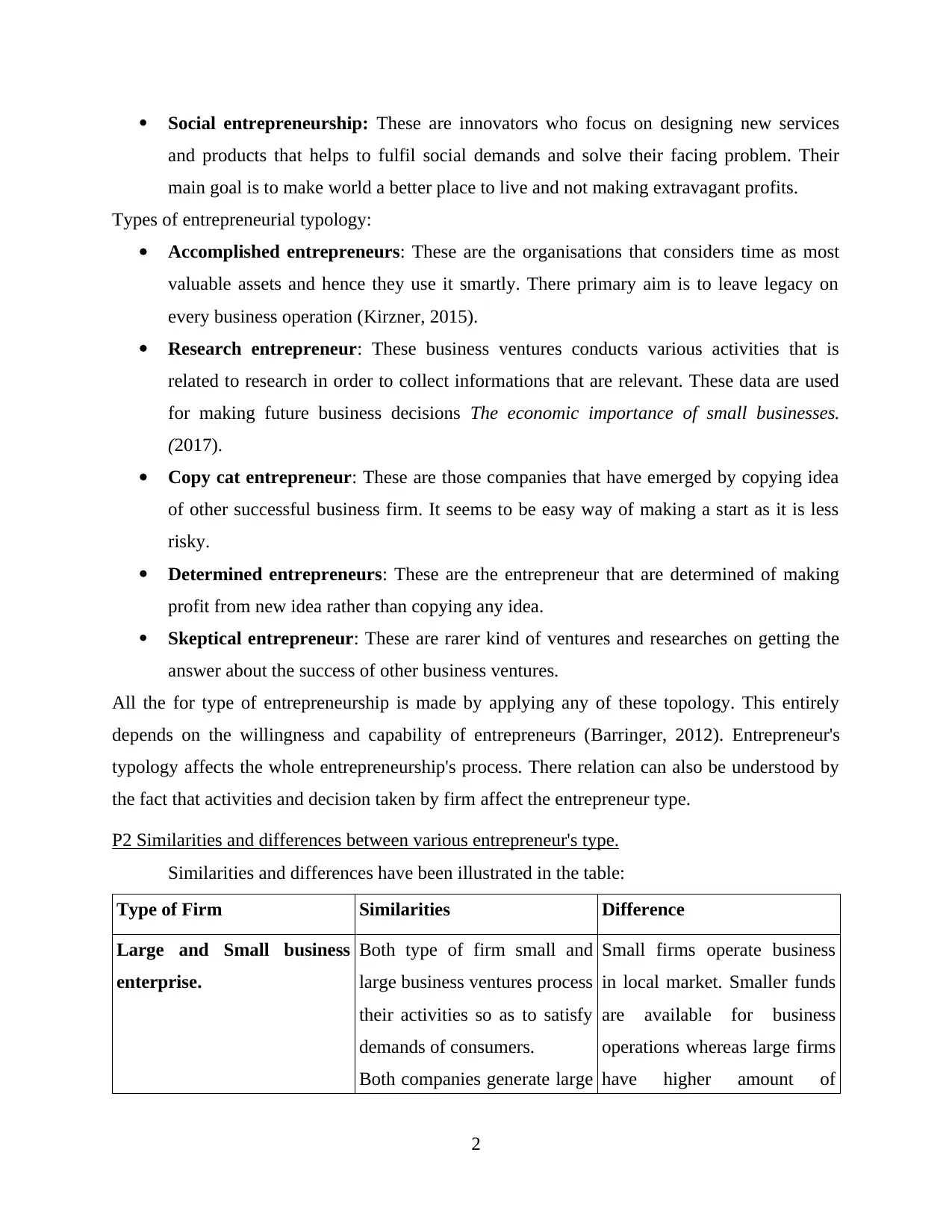
Social entrepreneurship: These are innovators who focus on designing new services
and products that helps to fulfil social demands and solve their facing problem. Their
main goal is to make world a better place to live and not making extravagant profits.
Types of entrepreneurial typology:
Accomplished entrepreneurs: These are the organisations that considers time as most
valuable assets and hence they use it smartly. There primary aim is to leave legacy on
every business operation (Kirzner, 2015).
Research entrepreneur: These business ventures conducts various activities that is
related to research in order to collect informations that are relevant. These data are used
for making future business decisions The economic importance of small businesses.
(2017).
Copy cat entrepreneur: These are those companies that have emerged by copying idea
of other successful business firm. It seems to be easy way of making a start as it is less
risky.
Determined entrepreneurs: These are the entrepreneur that are determined of making
profit from new idea rather than copying any idea.
Skeptical entrepreneur: These are rarer kind of ventures and researches on getting the
answer about the success of other business ventures.
All the for type of entrepreneurship is made by applying any of these topology. This entirely
depends on the willingness and capability of entrepreneurs (Barringer, 2012). Entrepreneur's
typology affects the whole entrepreneurship's process. There relation can also be understood by
the fact that activities and decision taken by firm affect the entrepreneur type.
P2 Similarities and differences between various entrepreneur's type.
Similarities and differences have been illustrated in the table:
Type of Firm Similarities Difference
Large and Small business
enterprise.
Both type of firm small and
large business ventures process
their activities so as to satisfy
demands of consumers.
Both companies generate large
Small firms operate business
in local market. Smaller funds
are available for business
operations whereas large firms
have higher amount of
2
and products that helps to fulfil social demands and solve their facing problem. Their
main goal is to make world a better place to live and not making extravagant profits.
Types of entrepreneurial typology:
Accomplished entrepreneurs: These are the organisations that considers time as most
valuable assets and hence they use it smartly. There primary aim is to leave legacy on
every business operation (Kirzner, 2015).
Research entrepreneur: These business ventures conducts various activities that is
related to research in order to collect informations that are relevant. These data are used
for making future business decisions The economic importance of small businesses.
(2017).
Copy cat entrepreneur: These are those companies that have emerged by copying idea
of other successful business firm. It seems to be easy way of making a start as it is less
risky.
Determined entrepreneurs: These are the entrepreneur that are determined of making
profit from new idea rather than copying any idea.
Skeptical entrepreneur: These are rarer kind of ventures and researches on getting the
answer about the success of other business ventures.
All the for type of entrepreneurship is made by applying any of these topology. This entirely
depends on the willingness and capability of entrepreneurs (Barringer, 2012). Entrepreneur's
typology affects the whole entrepreneurship's process. There relation can also be understood by
the fact that activities and decision taken by firm affect the entrepreneur type.
P2 Similarities and differences between various entrepreneur's type.
Similarities and differences have been illustrated in the table:
Type of Firm Similarities Difference
Large and Small business
enterprise.
Both type of firm small and
large business ventures process
their activities so as to satisfy
demands of consumers.
Both companies generate large
Small firms operate business
in local market. Smaller funds
are available for business
operations whereas large firms
have higher amount of
2

revenues every year.
Both these firms have motive
of gaining profits from their
business.
financial resources to invest
and they operate on national or
international market.
Role of managers and leaders
in small business is clear
whereas in large firm there
roles are comparatively
complex.
There requirements of
resources are different larger
firms needs abundant
resources while smaller firm
have less requirements.
Social and scalable firms Firms of these both types have
an objective of being
innovative and feature
products to large number of
consumers. Both firms
undertakes research activities
so as to determine the
changing demands of
customers.
Scalable firms have a role of
making larger amount of profit
in limited time period whereas
social ventures aims to solve
problems related to society.
Scalable ventures focuses to
capture larger part of the
market on the other hand
social ventures is to make
world a better place for living.
Roles and characteristic of private and public ventures:
Public ventures: It is venture that is controlled and monitored by firm. They aim to serve to the
people by sharing their profits with them. They generally conducts less research in these kind of
projects hence fails to generate greater extent of profit margins (Welter, 2011). They are
accountable to people. Their decision making process is slower and involves lot of members.
Their responsibilities towards the society is much greater as compared to private firms.
3
Both these firms have motive
of gaining profits from their
business.
financial resources to invest
and they operate on national or
international market.
Role of managers and leaders
in small business is clear
whereas in large firm there
roles are comparatively
complex.
There requirements of
resources are different larger
firms needs abundant
resources while smaller firm
have less requirements.
Social and scalable firms Firms of these both types have
an objective of being
innovative and feature
products to large number of
consumers. Both firms
undertakes research activities
so as to determine the
changing demands of
customers.
Scalable firms have a role of
making larger amount of profit
in limited time period whereas
social ventures aims to solve
problems related to society.
Scalable ventures focuses to
capture larger part of the
market on the other hand
social ventures is to make
world a better place for living.
Roles and characteristic of private and public ventures:
Public ventures: It is venture that is controlled and monitored by firm. They aim to serve to the
people by sharing their profits with them. They generally conducts less research in these kind of
projects hence fails to generate greater extent of profit margins (Welter, 2011). They are
accountable to people. Their decision making process is slower and involves lot of members.
Their responsibilities towards the society is much greater as compared to private firms.
3
⊘ This is a preview!⊘
Do you want full access?
Subscribe today to unlock all pages.

Trusted by 1+ million students worldwide
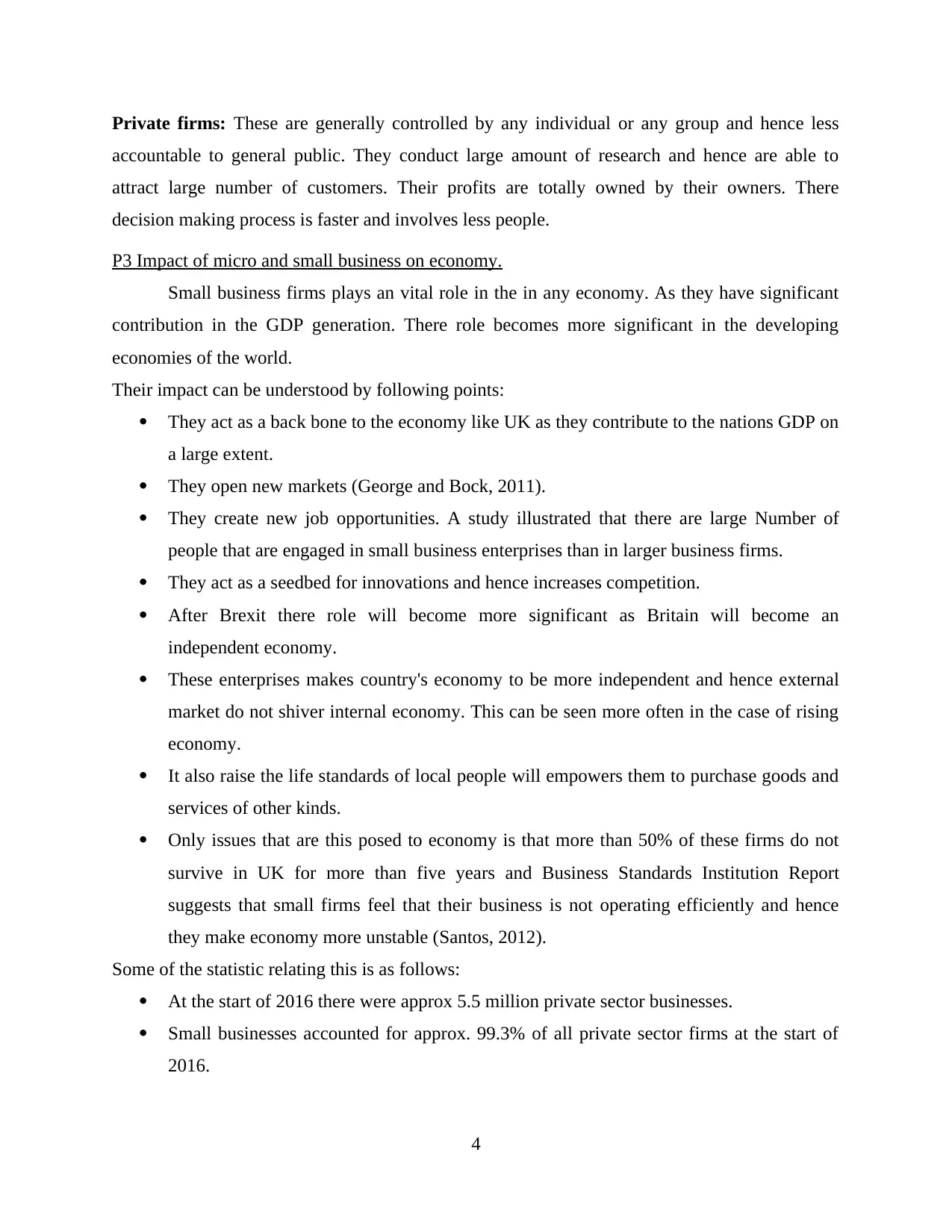
Private firms: These are generally controlled by any individual or any group and hence less
accountable to general public. They conduct large amount of research and hence are able to
attract large number of customers. Their profits are totally owned by their owners. There
decision making process is faster and involves less people.
P3 Impact of micro and small business on economy.
Small business firms plays an vital role in the in any economy. As they have significant
contribution in the GDP generation. There role becomes more significant in the developing
economies of the world.
Their impact can be understood by following points:
They act as a back bone to the economy like UK as they contribute to the nations GDP on
a large extent.
They open new markets (George and Bock, 2011).
They create new job opportunities. A study illustrated that there are large Number of
people that are engaged in small business enterprises than in larger business firms.
They act as a seedbed for innovations and hence increases competition.
After Brexit there role will become more significant as Britain will become an
independent economy.
These enterprises makes country's economy to be more independent and hence external
market do not shiver internal economy. This can be seen more often in the case of rising
economy.
It also raise the life standards of local people will empowers them to purchase goods and
services of other kinds.
Only issues that are this posed to economy is that more than 50% of these firms do not
survive in UK for more than five years and Business Standards Institution Report
suggests that small firms feel that their business is not operating efficiently and hence
they make economy more unstable (Santos, 2012).
Some of the statistic relating this is as follows:
At the start of 2016 there were approx 5.5 million private sector businesses.
Small businesses accounted for approx. 99.3% of all private sector firms at the start of
2016.
4
accountable to general public. They conduct large amount of research and hence are able to
attract large number of customers. Their profits are totally owned by their owners. There
decision making process is faster and involves less people.
P3 Impact of micro and small business on economy.
Small business firms plays an vital role in the in any economy. As they have significant
contribution in the GDP generation. There role becomes more significant in the developing
economies of the world.
Their impact can be understood by following points:
They act as a back bone to the economy like UK as they contribute to the nations GDP on
a large extent.
They open new markets (George and Bock, 2011).
They create new job opportunities. A study illustrated that there are large Number of
people that are engaged in small business enterprises than in larger business firms.
They act as a seedbed for innovations and hence increases competition.
After Brexit there role will become more significant as Britain will become an
independent economy.
These enterprises makes country's economy to be more independent and hence external
market do not shiver internal economy. This can be seen more often in the case of rising
economy.
It also raise the life standards of local people will empowers them to purchase goods and
services of other kinds.
Only issues that are this posed to economy is that more than 50% of these firms do not
survive in UK for more than five years and Business Standards Institution Report
suggests that small firms feel that their business is not operating efficiently and hence
they make economy more unstable (Santos, 2012).
Some of the statistic relating this is as follows:
At the start of 2016 there were approx 5.5 million private sector businesses.
Small businesses accounted for approx. 99.3% of all private sector firms at the start of
2016.
4
Paraphrase This Document
Need a fresh take? Get an instant paraphrase of this document with our AI Paraphraser
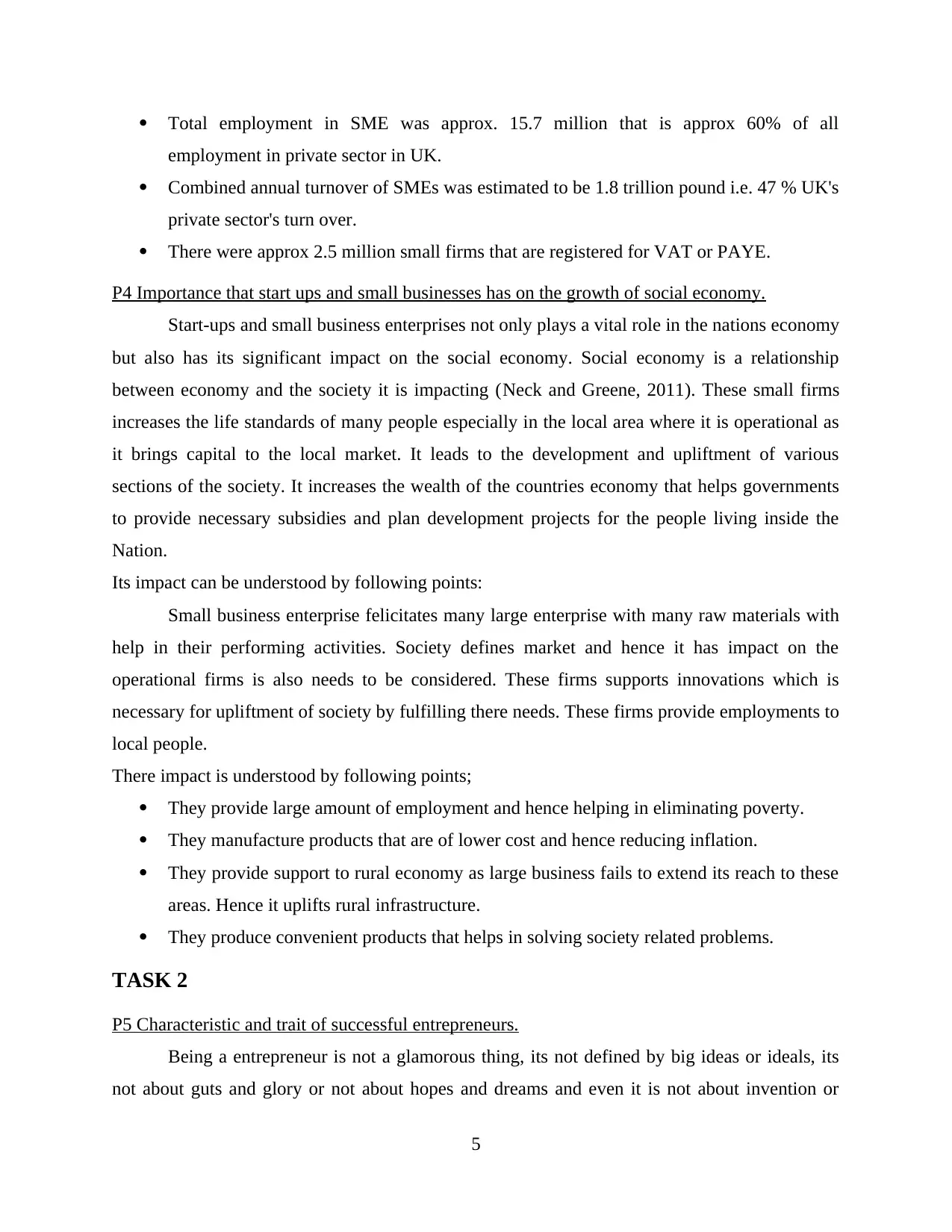
Total employment in SME was approx. 15.7 million that is approx 60% of all
employment in private sector in UK.
Combined annual turnover of SMEs was estimated to be 1.8 trillion pound i.e. 47 % UK's
private sector's turn over.
There were approx 2.5 million small firms that are registered for VAT or PAYE.
P4 Importance that start ups and small businesses has on the growth of social economy.
Start-ups and small business enterprises not only plays a vital role in the nations economy
but also has its significant impact on the social economy. Social economy is a relationship
between economy and the society it is impacting (Neck and Greene, 2011). These small firms
increases the life standards of many people especially in the local area where it is operational as
it brings capital to the local market. It leads to the development and upliftment of various
sections of the society. It increases the wealth of the countries economy that helps governments
to provide necessary subsidies and plan development projects for the people living inside the
Nation.
Its impact can be understood by following points:
Small business enterprise felicitates many large enterprise with many raw materials with
help in their performing activities. Society defines market and hence it has impact on the
operational firms is also needs to be considered. These firms supports innovations which is
necessary for upliftment of society by fulfilling there needs. These firms provide employments to
local people.
There impact is understood by following points;
They provide large amount of employment and hence helping in eliminating poverty.
They manufacture products that are of lower cost and hence reducing inflation.
They provide support to rural economy as large business fails to extend its reach to these
areas. Hence it uplifts rural infrastructure.
They produce convenient products that helps in solving society related problems.
TASK 2
P5 Characteristic and trait of successful entrepreneurs.
Being a entrepreneur is not a glamorous thing, its not defined by big ideas or ideals, its
not about guts and glory or not about hopes and dreams and even it is not about invention or
5
employment in private sector in UK.
Combined annual turnover of SMEs was estimated to be 1.8 trillion pound i.e. 47 % UK's
private sector's turn over.
There were approx 2.5 million small firms that are registered for VAT or PAYE.
P4 Importance that start ups and small businesses has on the growth of social economy.
Start-ups and small business enterprises not only plays a vital role in the nations economy
but also has its significant impact on the social economy. Social economy is a relationship
between economy and the society it is impacting (Neck and Greene, 2011). These small firms
increases the life standards of many people especially in the local area where it is operational as
it brings capital to the local market. It leads to the development and upliftment of various
sections of the society. It increases the wealth of the countries economy that helps governments
to provide necessary subsidies and plan development projects for the people living inside the
Nation.
Its impact can be understood by following points:
Small business enterprise felicitates many large enterprise with many raw materials with
help in their performing activities. Society defines market and hence it has impact on the
operational firms is also needs to be considered. These firms supports innovations which is
necessary for upliftment of society by fulfilling there needs. These firms provide employments to
local people.
There impact is understood by following points;
They provide large amount of employment and hence helping in eliminating poverty.
They manufacture products that are of lower cost and hence reducing inflation.
They provide support to rural economy as large business fails to extend its reach to these
areas. Hence it uplifts rural infrastructure.
They produce convenient products that helps in solving society related problems.
TASK 2
P5 Characteristic and trait of successful entrepreneurs.
Being a entrepreneur is not a glamorous thing, its not defined by big ideas or ideals, its
not about guts and glory or not about hopes and dreams and even it is not about invention or
5
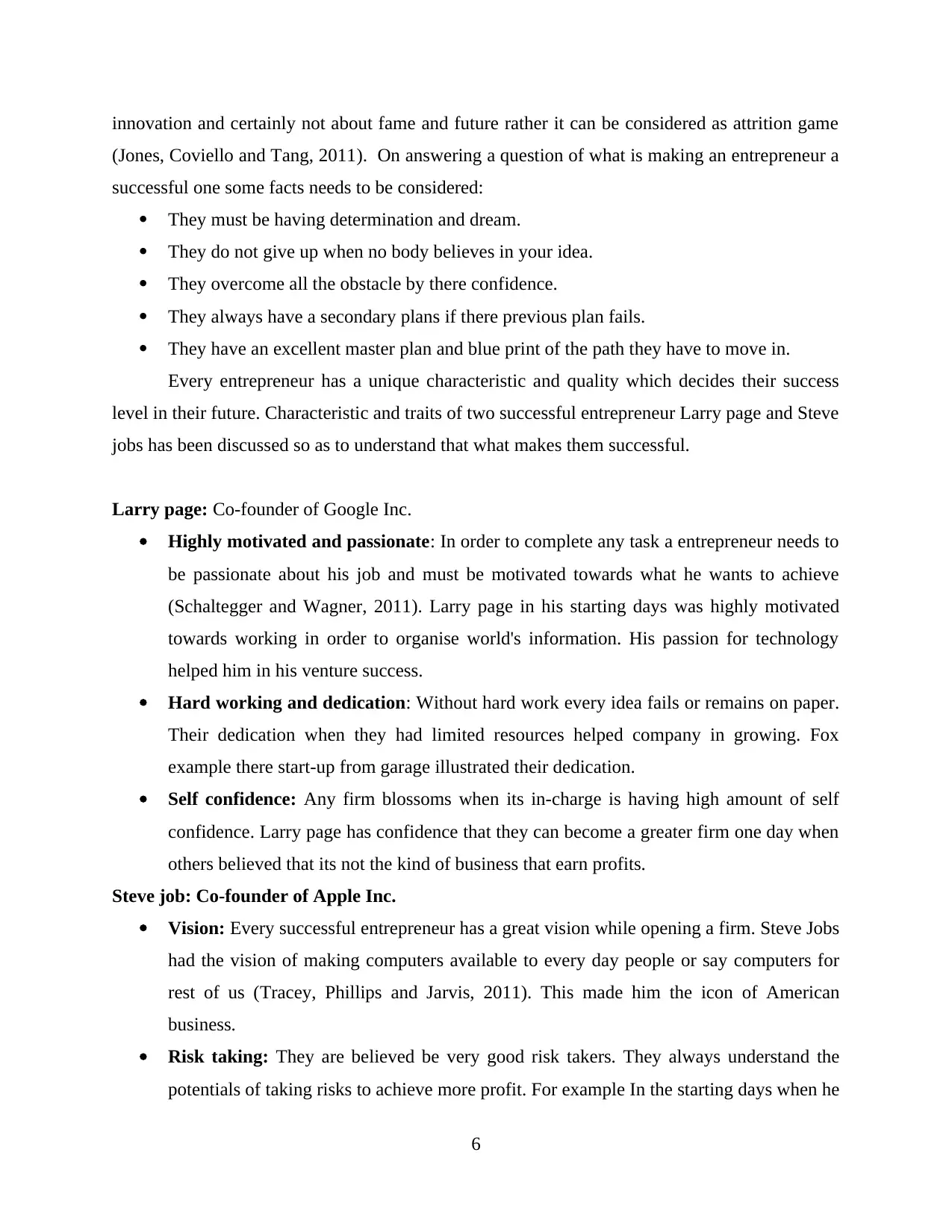
innovation and certainly not about fame and future rather it can be considered as attrition game
(Jones, Coviello and Tang, 2011). On answering a question of what is making an entrepreneur a
successful one some facts needs to be considered:
They must be having determination and dream.
They do not give up when no body believes in your idea.
They overcome all the obstacle by there confidence.
They always have a secondary plans if there previous plan fails.
They have an excellent master plan and blue print of the path they have to move in.
Every entrepreneur has a unique characteristic and quality which decides their success
level in their future. Characteristic and traits of two successful entrepreneur Larry page and Steve
jobs has been discussed so as to understand that what makes them successful.
Larry page: Co-founder of Google Inc.
Highly motivated and passionate: In order to complete any task a entrepreneur needs to
be passionate about his job and must be motivated towards what he wants to achieve
(Schaltegger and Wagner, 2011). Larry page in his starting days was highly motivated
towards working in order to organise world's information. His passion for technology
helped him in his venture success.
Hard working and dedication: Without hard work every idea fails or remains on paper.
Their dedication when they had limited resources helped company in growing. Fox
example there start-up from garage illustrated their dedication.
Self confidence: Any firm blossoms when its in-charge is having high amount of self
confidence. Larry page has confidence that they can become a greater firm one day when
others believed that its not the kind of business that earn profits.
Steve job: Co-founder of Apple Inc.
Vision: Every successful entrepreneur has a great vision while opening a firm. Steve Jobs
had the vision of making computers available to every day people or say computers for
rest of us (Tracey, Phillips and Jarvis, 2011). This made him the icon of American
business.
Risk taking: They are believed be very good risk takers. They always understand the
potentials of taking risks to achieve more profit. For example In the starting days when he
6
(Jones, Coviello and Tang, 2011). On answering a question of what is making an entrepreneur a
successful one some facts needs to be considered:
They must be having determination and dream.
They do not give up when no body believes in your idea.
They overcome all the obstacle by there confidence.
They always have a secondary plans if there previous plan fails.
They have an excellent master plan and blue print of the path they have to move in.
Every entrepreneur has a unique characteristic and quality which decides their success
level in their future. Characteristic and traits of two successful entrepreneur Larry page and Steve
jobs has been discussed so as to understand that what makes them successful.
Larry page: Co-founder of Google Inc.
Highly motivated and passionate: In order to complete any task a entrepreneur needs to
be passionate about his job and must be motivated towards what he wants to achieve
(Schaltegger and Wagner, 2011). Larry page in his starting days was highly motivated
towards working in order to organise world's information. His passion for technology
helped him in his venture success.
Hard working and dedication: Without hard work every idea fails or remains on paper.
Their dedication when they had limited resources helped company in growing. Fox
example there start-up from garage illustrated their dedication.
Self confidence: Any firm blossoms when its in-charge is having high amount of self
confidence. Larry page has confidence that they can become a greater firm one day when
others believed that its not the kind of business that earn profits.
Steve job: Co-founder of Apple Inc.
Vision: Every successful entrepreneur has a great vision while opening a firm. Steve Jobs
had the vision of making computers available to every day people or say computers for
rest of us (Tracey, Phillips and Jarvis, 2011). This made him the icon of American
business.
Risk taking: They are believed be very good risk takers. They always understand the
potentials of taking risks to achieve more profit. For example In the starting days when he
6
⊘ This is a preview!⊘
Do you want full access?
Subscribe today to unlock all pages.

Trusted by 1+ million students worldwide
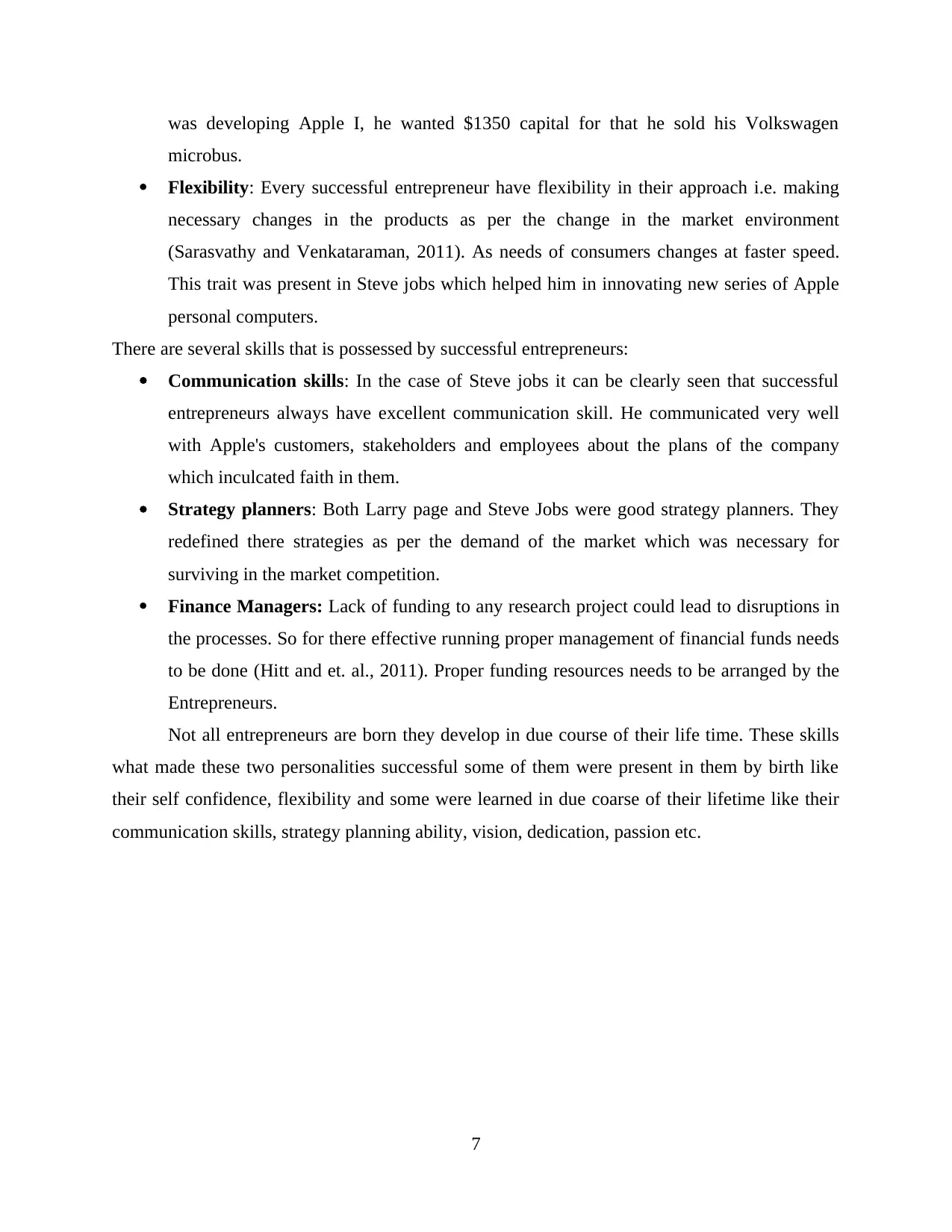
was developing Apple I, he wanted $1350 capital for that he sold his Volkswagen
microbus.
Flexibility: Every successful entrepreneur have flexibility in their approach i.e. making
necessary changes in the products as per the change in the market environment
(Sarasvathy and Venkataraman, 2011). As needs of consumers changes at faster speed.
This trait was present in Steve jobs which helped him in innovating new series of Apple
personal computers.
There are several skills that is possessed by successful entrepreneurs:
Communication skills: In the case of Steve jobs it can be clearly seen that successful
entrepreneurs always have excellent communication skill. He communicated very well
with Apple's customers, stakeholders and employees about the plans of the company
which inculcated faith in them.
Strategy planners: Both Larry page and Steve Jobs were good strategy planners. They
redefined there strategies as per the demand of the market which was necessary for
surviving in the market competition.
Finance Managers: Lack of funding to any research project could lead to disruptions in
the processes. So for there effective running proper management of financial funds needs
to be done (Hitt and et. al., 2011). Proper funding resources needs to be arranged by the
Entrepreneurs.
Not all entrepreneurs are born they develop in due course of their life time. These skills
what made these two personalities successful some of them were present in them by birth like
their self confidence, flexibility and some were learned in due coarse of their lifetime like their
communication skills, strategy planning ability, vision, dedication, passion etc.
7
microbus.
Flexibility: Every successful entrepreneur have flexibility in their approach i.e. making
necessary changes in the products as per the change in the market environment
(Sarasvathy and Venkataraman, 2011). As needs of consumers changes at faster speed.
This trait was present in Steve jobs which helped him in innovating new series of Apple
personal computers.
There are several skills that is possessed by successful entrepreneurs:
Communication skills: In the case of Steve jobs it can be clearly seen that successful
entrepreneurs always have excellent communication skill. He communicated very well
with Apple's customers, stakeholders and employees about the plans of the company
which inculcated faith in them.
Strategy planners: Both Larry page and Steve Jobs were good strategy planners. They
redefined there strategies as per the demand of the market which was necessary for
surviving in the market competition.
Finance Managers: Lack of funding to any research project could lead to disruptions in
the processes. So for there effective running proper management of financial funds needs
to be done (Hitt and et. al., 2011). Proper funding resources needs to be arranged by the
Entrepreneurs.
Not all entrepreneurs are born they develop in due course of their life time. These skills
what made these two personalities successful some of them were present in them by birth like
their self confidence, flexibility and some were learned in due coarse of their lifetime like their
communication skills, strategy planning ability, vision, dedication, passion etc.
7
Paraphrase This Document
Need a fresh take? Get an instant paraphrase of this document with our AI Paraphraser

P6 Personality that reflects entrepreneurial motivation and mindset.
Personality of entrepreneurs are different from masses. There motivational level helps
organisations in achieving their business successfully. Steve jobs and Larry page had such
characteristics that helped company in capturing larger part of the market. Positive mindset
encourages entrepreneur in managing their risky decisions and encountering the problem faced
by company from time to time (Wiklund and et. al., 2011). In absence of high motivational level
their thinking capabilities gets reduced. In order to achieve these levels of motivation and
positive mindset there are some factors that play a vital role in developing these entrepreneurial
capabilities. Some of them are as follows:
Family upbringing: Family plays an decisive role in developing a personality that has
qualities of entrepreneurial motivation and mindset. As the family values are reflected in
8
Source 1: Entrepreneur traits, 2017
Personality of entrepreneurs are different from masses. There motivational level helps
organisations in achieving their business successfully. Steve jobs and Larry page had such
characteristics that helped company in capturing larger part of the market. Positive mindset
encourages entrepreneur in managing their risky decisions and encountering the problem faced
by company from time to time (Wiklund and et. al., 2011). In absence of high motivational level
their thinking capabilities gets reduced. In order to achieve these levels of motivation and
positive mindset there are some factors that play a vital role in developing these entrepreneurial
capabilities. Some of them are as follows:
Family upbringing: Family plays an decisive role in developing a personality that has
qualities of entrepreneurial motivation and mindset. As the family values are reflected in
8
Source 1: Entrepreneur traits, 2017
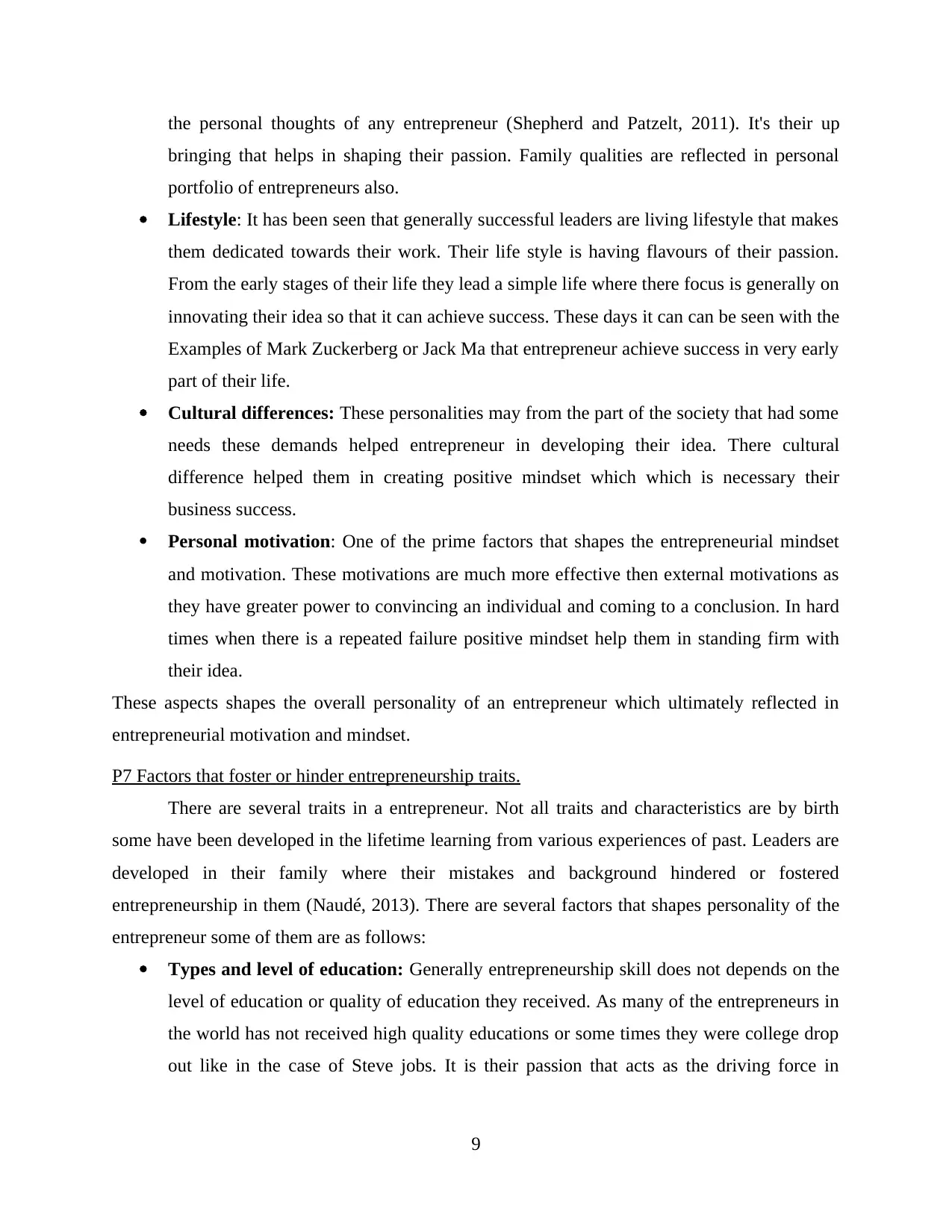
the personal thoughts of any entrepreneur (Shepherd and Patzelt, 2011). It's their up
bringing that helps in shaping their passion. Family qualities are reflected in personal
portfolio of entrepreneurs also.
Lifestyle: It has been seen that generally successful leaders are living lifestyle that makes
them dedicated towards their work. Their life style is having flavours of their passion.
From the early stages of their life they lead a simple life where there focus is generally on
innovating their idea so that it can achieve success. These days it can can be seen with the
Examples of Mark Zuckerberg or Jack Ma that entrepreneur achieve success in very early
part of their life.
Cultural differences: These personalities may from the part of the society that had some
needs these demands helped entrepreneur in developing their idea. There cultural
difference helped them in creating positive mindset which which is necessary their
business success.
Personal motivation: One of the prime factors that shapes the entrepreneurial mindset
and motivation. These motivations are much more effective then external motivations as
they have greater power to convincing an individual and coming to a conclusion. In hard
times when there is a repeated failure positive mindset help them in standing firm with
their idea.
These aspects shapes the overall personality of an entrepreneur which ultimately reflected in
entrepreneurial motivation and mindset.
P7 Factors that foster or hinder entrepreneurship traits.
There are several traits in a entrepreneur. Not all traits and characteristics are by birth
some have been developed in the lifetime learning from various experiences of past. Leaders are
developed in their family where their mistakes and background hindered or fostered
entrepreneurship in them (Naudé, 2013). There are several factors that shapes personality of the
entrepreneur some of them are as follows:
Types and level of education: Generally entrepreneurship skill does not depends on the
level of education or quality of education they received. As many of the entrepreneurs in
the world has not received high quality educations or some times they were college drop
out like in the case of Steve jobs. It is their passion that acts as the driving force in
9
bringing that helps in shaping their passion. Family qualities are reflected in personal
portfolio of entrepreneurs also.
Lifestyle: It has been seen that generally successful leaders are living lifestyle that makes
them dedicated towards their work. Their life style is having flavours of their passion.
From the early stages of their life they lead a simple life where there focus is generally on
innovating their idea so that it can achieve success. These days it can can be seen with the
Examples of Mark Zuckerberg or Jack Ma that entrepreneur achieve success in very early
part of their life.
Cultural differences: These personalities may from the part of the society that had some
needs these demands helped entrepreneur in developing their idea. There cultural
difference helped them in creating positive mindset which which is necessary their
business success.
Personal motivation: One of the prime factors that shapes the entrepreneurial mindset
and motivation. These motivations are much more effective then external motivations as
they have greater power to convincing an individual and coming to a conclusion. In hard
times when there is a repeated failure positive mindset help them in standing firm with
their idea.
These aspects shapes the overall personality of an entrepreneur which ultimately reflected in
entrepreneurial motivation and mindset.
P7 Factors that foster or hinder entrepreneurship traits.
There are several traits in a entrepreneur. Not all traits and characteristics are by birth
some have been developed in the lifetime learning from various experiences of past. Leaders are
developed in their family where their mistakes and background hindered or fostered
entrepreneurship in them (Naudé, 2013). There are several factors that shapes personality of the
entrepreneur some of them are as follows:
Types and level of education: Generally entrepreneurship skill does not depends on the
level of education or quality of education they received. As many of the entrepreneurs in
the world has not received high quality educations or some times they were college drop
out like in the case of Steve jobs. It is their passion that acts as the driving force in
9
⊘ This is a preview!⊘
Do you want full access?
Subscribe today to unlock all pages.

Trusted by 1+ million students worldwide
1 out of 16
Related Documents
Your All-in-One AI-Powered Toolkit for Academic Success.
+13062052269
info@desklib.com
Available 24*7 on WhatsApp / Email
![[object Object]](/_next/static/media/star-bottom.7253800d.svg)
Unlock your academic potential
Copyright © 2020–2026 A2Z Services. All Rights Reserved. Developed and managed by ZUCOL.



![Entrepreneurship and Small Business Impact Report - [University Name]](/_next/image/?url=https%3A%2F%2Fdesklib.com%2Fmedia%2Fimages%2Fwj%2Fd1f42599211847658d3fd556aa563fa5.jpg&w=256&q=75)

